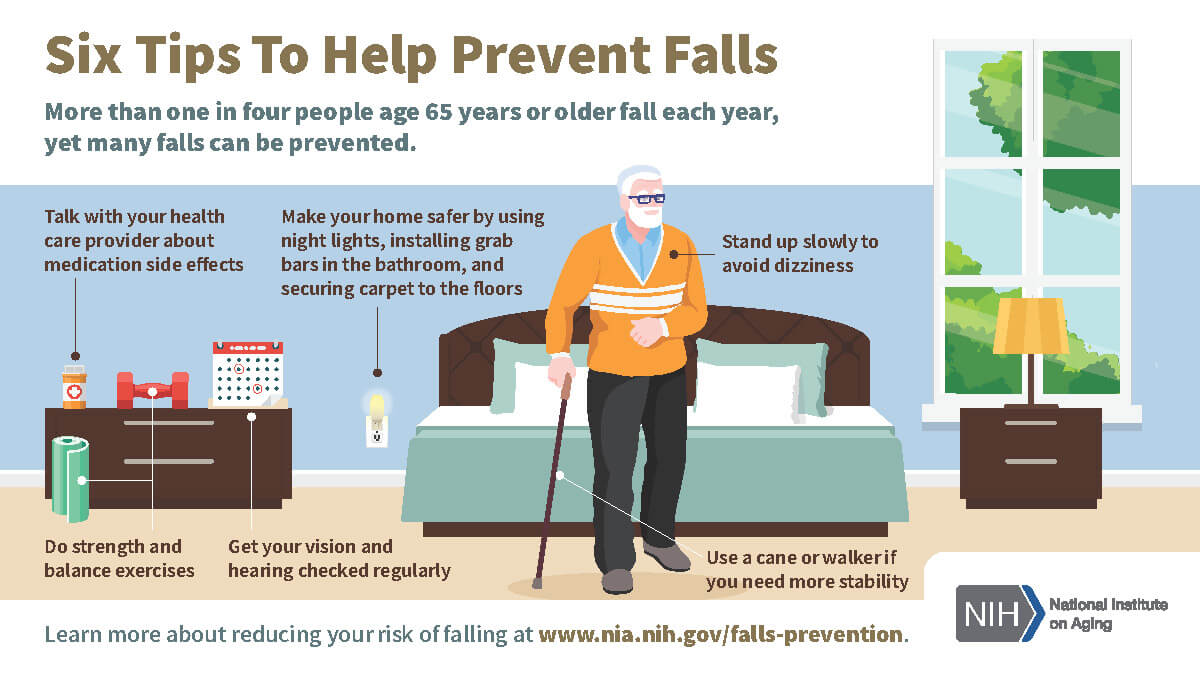Older Adults and Balance Problems

Have you ever felt dizzy, lightheaded, or as if the room were spinning around you? These can be troublesome sensations. If the feeling happens often, it could be a sign of a balance problem.
Many older adults experience problems with balance and dizziness. Problems can be caused by certain medications, balance disorders, or other medical conditions. Balance problems are one reason older people fall. Maintaining good balance as you age and learning about fall prevention can help you get around, stay independent, and carry out daily activities.
Causes of balance problems
People are more likely to have problems with balance as they grow older. In some cases, you can help reduce your risk for certain balance problems, but problems often can start suddenly and without obvious cause.
Balance problems can be caused by certain medications or medical conditions. The list below covers some common causes of balance problems.
-
Medications. Check with your doctor if you notice balance problems while taking certain medications. Ask if other medications can be used instead, if the dosage can be safely reduced, or if there are other ways to reduce unwanted side effects.
-
Inner ear problems. A part of the inner ear called the labyrinth is responsible for balance. When the labyrinth becomes inflamed, a condition called labyrinthitis occurs, causing vertigo and imbalance. Certain ear diseases and infections can lead to labyrinthitis.
-
Alcohol. Alcohol in the blood can also cause dizziness and balance problems by affecting how the inner ear works.
-
Other medical conditions. Certain conditions, such as diabetes, heart disease, stroke, or problems with your vision, thyroid, nerves, or blood vessels can cause dizziness and other balance problems.
Visit the NIH National Institute on Deafness and Other Communication Disorders website for more information on specific balance disorders.
Symptoms of balance disorders
If you have a balance disorder, you might experience symptoms such as:
- Dizziness or vertigo (a spinning sensation)
- Falling or feeling as if you are going to fall
- Staggering when you try to walk
- Lightheadedness, faintness, or a floating sensation
- Blurred vision
- Confusion or disorientation
- Other symptoms might include nausea and vomiting; diarrhea; changes in heart rate and blood pressure and feelings of fear, anxiety, or panic. Symptoms may come and go over short periods or last for a long time and can lead to fatigue and depression.
Do I have a balance problem? Questions to ask yourself
You can help identify a balance problem by asking yourself some key questions. If you answer “yes” to any of these questions, it may be time to talk with your doctor:
- Do I feel unsteady?
- Do I feel dizzy or as if the room is spinning around me, even if only for brief periods of time?
- Do I feel as if I’m moving when I know I’m standing or sitting still?
- Do I lose my balance and fall?
- Do I feel as if I’m falling?
- Does my vision become blurred?
If you think you have a balance problem, schedule an appointment with your doctor. Your doctor may refer you to an otolaryngologist, a physician with special training in problems of the ear, nose, throat, head, and neck.
Treatments for balance problems and disorders
Exercises that involve moving the head and body in certain ways can help treat some balance disorders. Patient-specific exercises are developed by a physical therapist or other professional who understands balance and its relationship with other systems in the body.
Balance problems due to high blood pressure may be managed by eating less salt (sodium), maintaining a healthy weight, and exercising. Balance problems due to low blood pressure may be managed by drinking plenty of fluids such as water; avoiding alcohol; and being cautious regarding your body’s posture and movement, such as never standing up too quickly. Consult with your doctor about making any changes in your diet or activity level.
Coping with a balance disorder
Some people with a balance disorder may not be able to fully relieve their dizziness and will need to find ways to cope with it. A vestibular rehabilitation therapist can help develop an individualized treatment plan.
Chronic balance problems can affect all aspects of your life, including your relationships, work performance, and your ability to carry out daily activities. Support groups provide the opportunity to learn from other people with similar experiences and challenges.
If you have trouble with your balance, talk to your doctor about whether it’s safe to drive, and about ways to lower your risk of falling during daily activities, such as walking up or down stairs, using the bathroom, or exercising. To reduce your risk of injury from dizziness, do not walk in the dark. Avoid high heels and, instead, wear non-skid, rubber-soled, low-heeled shoes. Don’t walk on stairs or floors in socks or in shoes and slippers with smooth soles. If necessary, use a cane or walker. Make changes to add safety features at your home and workplace, such as adding handrails.
If you’d like more help with your balance, LifePath’s Healthy Living Program has a free “A Matter of Balance–Managing Concerns About Falls” in-person workshop in Orange beginning in May. For more information or to register, email Andi Waisman, Healthy Living Program Manager, at awaisman@LifePathMA.org or call her at 413-773-5555 x2297 or 978-544-2259 x2297.